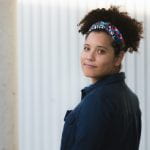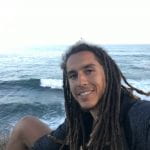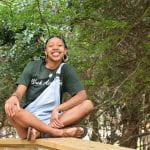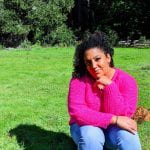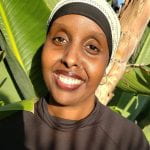(in alphabetical order)
Andrea “Dre” Vazquez
Andrea del Carmen Vazquez is a proud South Central LA native with diasporic roots in agriculture California. As a daughter of a Mexican ranchero and Black ecuatoriana, her work locates the everyday mechanisms of geographies of anti-blackness and how they shape the lives of Black and Latinx youth in Mexican/Chicanx Californian communities. As such, her ethnography grapples with the ways that racialized disposability and land deposition interlock with schooling to fractures cross racial solidarity, but also to highlight the way that youth reimagine, and reconstitute the story of space. You can read her work in The Journal for Mexican-American Educators, and Intervenxions, and follow her on Twitter at @_LaVazquez_ .
Breanna Byrd
Breanna Byrd is a writer, performer, plant enthusiast, and second-year Ph.D. student in the Department of Feminist Studies at UC Santa Cruz. She is also the graduate student intern for the African American Resource and Cultural Center on campus. With interests in African Diasporic studies, Native/Indigenous studies, Ecowomanist histories, and Black Feminist theory (to name a few) their work at this moment engages questions around the “Anthropocene,” apocalypse, and sustainable futures. Looking to where narratives of world-ending/world-making take place, she thinks with black geographies to center black folx’s stories and practices of care. From Durham, North Carolina, they are committed to learning from various “Souths” to understand historical and cultural production and the relationships black peoples (primarily in diaspora) have to place, the material world, and each other.
Christopher Lang
Chris Lang is a 4th year Environmental Studies PhD student who examines the relationship between commodity ubiquity, anti-Blackness, environmental injustice, and an unrelenting ecocide. He analyzes uneven geographies of pollution across nodes of extraction, production, consumption, and disposal, destabilizing the rigid categorization of human / animal / object as separate by weaving the discourse of mass disposability through Black and Native Studies. He merges Black vegan with zero waste praxes to co-vision a liberation-based divestment from “omnipresent death” that foregrounds expansive, reciprocal communal care over the prevailing, individualizing, and commodifying frames of ethical consumerism. Outside of research, Chris is the graduate student intern for the People of Color Sustainability Collective, which creates programming and community for diversity in ecosocialism.
Ki’Amber Thompson
Ki’Amber Thompson (she/they) is an educator, facilitator, artist, healing justice practitioner, and a first-year doctoral student in Sociology at UCSC. Ki’Amber’s work lies at the intersection of prison industrial complex abolition and environmental justice. She is interested in questions of place and space, healing, and relationality. In 2019, Ki’Amber founded the Charles Roundtree Bloom Project, an outdoor healing justice program for youth impacted by incarceration in Yanguana/San Antonio, Texas. In addition to building out the Bloom Project in collaboration with community, Ki’Amber is using her academic research to theorize the Bloom Project as a method for creating spaces where Black youth can breathe through bridging abolitionist and decolonial praxes to explore the possibilities of alternative worlds that can emerge as well as hold the praxical tensions that complicate our capacities to heal and grow the worlds we long for.
shah noor hussein

shah noor is a writer, visual artist, and doctoral pre-candidate in the Department of Anthropology, with a designated emphasis in Critical Race & Ethnic Studies. shah’s research aims to (re)center marginalized voices in dialogues on alternative epistemologies and cultural reproduction through a multimedia study of popular culture and women’s music in Sudan. They have served as a Writing Fellow at the California Institute of Integral Studies (2016-2017), a Teaching Fellow for the Peralta Community College System in Oakland (2018-2019), and a Graduate Pedagogy Fellow with the Center for Innovations in Teaching and Learning at UCSC (2020-2021). shah earned their B.A. in environmental policy and gender studies, and their M.A. in Anthropology and Social Change. For leisure, shah enjoys talking to their plants, doing yoga, and finding the best mocha lattes in Oakland. You can engage with shah’s writing and artwork on their website: shahnoorhussein.com.
Theresa Hice-Fromille
Theresa Hice-Fromille is a 4th year Ph.D. student in Sociology with Designated Emphases in Critical Race and Ethnic Studies and Feminist Studies. She considers herself a transdisciplinary scholar and engages Black feminist thought, youth studies and education, and Black geographies. Her dissertation investigates Black youth identity in the context of international travel and Black feminist community pedagogy; emphasizes engaged research; and allows her to collaborate with the coolest organization in the world(!) – a community-based roots travel organization in Baltimore. She is an introverted, first-generation grad student, East Coast Virgo mama who has a healthy obsession with boba tea and occasionally bakes and quilts.
Xafsa Ciise
Xafsa’s current research examines the symbolic, material and political relationship between Islam and ‘risk’ across four sites — trauma studies, visual studies, environmental studies and the social studies of finance—in order to show how Africa and African/Black Muslims continue to be marked as in need of intervention and management. To theorize this relationship, this work turns to the formation and crystallization of the social sciences (anthropology, psychology, geography) in the African colonial context as an entry point for tracking the enduring forms of ‘evidence’ that these fields produced about the link between risk and the categories of the racial and the religious. This project has two aims: (1) to reorient current literature on risk governance by situating the concept of risk in longer histories of empire, theology and the social sciences, and (2) to reanimate the philosophical and political question of African sovereignty, an increasingly urgent question as Africans on the African continent are subjected to the horrific and compounding violence of the long ‘War on Terror’ and the climate crisis.
